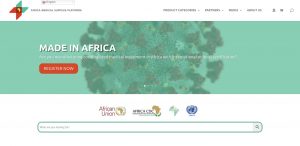The Africa Medical Supplies Platform (AMSP) is a non-profit continental online procurement platform designed to resolve Africa’s COVID-19 medical supply predicament. Besides strengthening Africa’s supply management system and bolstering local production of pharmaceuticals the main objective of the platform is to provide equitable access to medicines and medical supplies for all participating countries. The platform pools certified medical suppliers and aggregates demand, thereby creating a larger market that saves time, enables competitive pricing, and ensures the security of the supplies. Sourced and donated medical supplies are distributed proportionately by taking into account the population, disease burden, and vulnerability level of Member States. After quotas are designated, Member States are required to make payment into a holding account at Africa’s Export-Import Bank (Afreximbank) within a stipulated number of days and then the supplies are delivered by designated commercial carriers
Policy Analyst, Lawyer
New York University
Africa’s Innovative COVID-19 Response
The Africa Medical Supplies Platform
Globally, access to medicines and medical supplies is largely driven by demand and the ability to pay rather than need. Notwithstanding numerous factors that impede access to medicines and medical supplies, this paper will focus on the recent innovations in supply chain management in Africa. These developments are particularly significant as over 70% of all pharmaceuticals consumed in Africa are imported, and less than 2% are manufactured locally.[1]
The heavy reliance on imported pharmaceuticals further strains limited health financing and exposes vulnerable populations to greater inequalities in accessing effective and affordable medicines.[2]
In 2012, the Heads of State at the African Union Summit endorsed the African Pharmaceutical Manufacturing Plan to foster local production of quality and affordable pharmaceuticals.[3] However, demand-side barriers caused by buyer fragmentation, different markets, and the small economic size of several African countries raised feasibility and sustainability concerns.[4] These are valid concerns because a small country’s significant need for medicines might not translate to sufficient demand leading to higher cost and lower availability.[5] Addressing these restraints became more imaginable with the ratification of the Africa Free Trade Agreement (AfCTA), which seeks to create a single continental market for goods and services.[6] The projections of improved harmonization and continental access have opened up possibilities for developing unified continental regulatory standards for the pharmaceutical industry. These uniform standards, if achieved across the continent, would facilitate pooled procurement and local drug production.
Leveraging on the AfCTA, the Small Island Developing States (SID), United Nations Economic Commission for Africa (ECA), and the Intergovernmental Authority on Development (IGAD) advocated for the development of the AfCTA-Anchored Pharmaceutical Project with a three-fold approach of pooled procurement, local production, and improved drug quality.[7] This pilot initiative focused on improving access to maternal and child health care (MCH) products in select countries from Regional Economic Communities (RECS) with existing pooled procurement projects.[8] The experiences, practices, policies, and lessons learned from implementing successful regional pooled procurement initiatives, like the Southern African Regional Program on Access to Medicines (SARPAM), served as a precursor to Africa’s innovative response to the disrupted global drug supply chain during the COVID-19 pandemic.[9]
In recognition of the vulnerability of the African region to COVID-19 and its adverse effects, the Africa Center for Disease Control (CDC) adopted a containment and mitigation response strategy.[10] While swift containment measures were successfully put in place, mitigating the spread across African countries was difficult mainly due to limited testing capacity and scarce medical supplies.[11] Pharmaceutical companies responded to the disrupted global supply chain with unpredictable price changes and prioritization of the highest bidders. Consequently, several African countries lacked COVID-19 medical supplies and became more vulnerable to substandard pharmaceutical products in circulation.[12] The disparity in accessing essential medical supplies in Africa provided the necessary impetus for creating the Africa Medical Supplies Platform (AMSP), which is an expanded version of the regional pooled procurement arrangement proposed by the AfCTFA-anchored pharmaceutical project.
The AMSP is a non-profit continental online procurement platform designed under the leadership of Strive Musiyiwa, African Union Special Envoy, to resolve Africa’s COVID-19 medical supply predicament. Besides strengthening Africa’s supply management system and bolstering local production of pharmaceuticals the main objective of the platform is to provide equitable access to medicines and medical supplies for all participating countries. Following the launch of the platform, the Member States of the Caribbean Community (CARICOM) have also joined the platform to benefit from the competitive procurement of medical supplies.[13]
The platform pools certified medical suppliers and aggregates demand, thereby creating a larger market that saves time, enables competitive pricing, and ensures the security of the supplies. Sourced and donated medical supplies are distributed proportionately by taking into account the population, disease burden, and vulnerability level of Member States. After quotas are designated, Member States are required to make payment into a holding account at Africa’s Export-Import Bank (Afreximbank) within a stipulated number of days and then the supplies are delivered by designated commercial carriers. Predesignated quotas are exchangeable for needed medical supplies on the platform and the Ministry of Health officials can request the procurement of unavailable medical supplies.[14]
Provision is equally made for countries that have insufficient funds to pay by extending a line of credit to them with the Afreximbank. This funding is sourced from the $3 million Pandemic Trade Impact Mitigation Facility set up by Afreximbank to support African countries’ COVID-19 response effort of which $200 million is designated for financing the production of medical supplies and equipment.[15]
The world’s first continental digital procurement platform has gone beyond improving procurement to boosting indigenous pharmaceutical production with plans in place for establishing an open license for enlisting local manufacturers. Furthermore, African manufacturers are prioritized on the platform by featuring made in Africa options on the first page. These incentives are expected to motivate the diversification of operations by both small and large African companies to address the demand and supply mismatch for protective equipment and COVID-19 supplies in Africa.[16]
The realization of the AMSP during unprecedented times is a testament that the solutions for African problems lie within Africa. This precarious moment, when Africa’s leadership is displaying political commitment to health, should be leveraged upon to increase the capacity of local drug manufacturing in Africa. Therefore, more African countries need to sign and ratify the treaty for establishing the African Medicines Agency (AMA) to ensure that the governance and regulation of medicines in Africa are strengthened and harmonized.
References
[1] Supporting the production of pharmaceuticals in Africa. (2015, December 23). Retrieved July 10, 2020, from https://www.who.int/bulletin/volumes/94/1/15-163782/en/
[2]Report of the High-Level Stakeholder Meeting on: The AfCTA: Opportunities for pooled procurement of essential drugs and products and local pharmaceutical production for the continent.( 2019, November 21). Retrieved July 22, 2020 from https://www.uneca.org/sites/default/files/uploaded-documents/AfCFTA-Pharma 2019/pharma_high_level_meeting_report_final.pdf
[3]Pharmaceutical Manufacturing Plan For Africa: AUDA-NEPAD. Retrieved August 10, 2020, from https://nepad.org/publication/pharmaceutical-manufacturing-plan-africa
[4]O’Donnell, O. (2007, December 01). Access to health care in developing countries: Breaking down demand side barriers. Retrieved August 11, 2020, from https://www.scielosp.org/article/csp/2007.v23n12/2820-2834/
[5]Improving access to essential medicines for mental, neurological, and substance use disorders in Sub-Saharan Africa: Workshop summary. Forum on neuroscience and nervous system disorders. (2014, August 26). Retrieved August 25, 2020 from https://www.worldcat.org/title/improving-access-to-essential-medicines-for-mental-neurological-and-substance-use-disorders-in-sub-saharan-africa-workshop-summary-forum-on-neuroscience-and-nervous-system-disorders/oclc/899280083
[6]African Continental Free Trade Area (AfCFTA) Legal Texts and Policy Documents. Retrieved August 15, 2020, from https://www.tralac.org/resources/our-resources/6730-continental-free-trade-area-cfta.html
[7]Report of the High-Level Stakeholder Meeting on :The AfCTA: Opportunities for pooled procurement of essential drugs and products and local pharmaceutical production for the continent. (2019, November 21). Retrieved August 20, 2020 from https://www.uneca.org/sites/default/files/uploaded-documents/AfCFTA-Pharma-2019/pharma_high_level_meeting_report_final.pdf
[8] Third Africa Business Forum 2020 on Africa Continental Free Trade Area: An opportunity to accelerate towards the implementation of the 2030 Agenda and Agenda 2063 through pooled procurement of the essential safe and quality drugs and products and local pharmaceutical production for the continent. Retrieved July 28, 2020 from https://www.uneca.org/sites/default/files/uploaded-documents/Africa-Business-Forum/3rd/technical_background_paper_-_health-the_pharma_issue_-_en_-_e2000083.pdf
[9] SADC Pooled Procurement of Essential Medicines and Medical Supplies Situational Analysis and Feasibility Study Retrieved August 21,2020 from https://www.sadc.int/files/6614/1890/8516/sadc___sadc_pooled_procurement_of_essential_medicines_and_medical_suppli….pdf
[10]Strategic Response Plan in the WHO African Region. Retrieved September 1, 2020 from https://www.afro.who.int/sites/default/files/2020-06/SPRP%20BUDGET%200520_01.pdf
[11]Kavanagh, M. M., Erondu, N. A., Tomori, O., Dzau, V. J., Okiro, E. A., Maleche, A., Aniebo, I. C., Rugege, U., Holmes, C. B., & Gostin, L. O. (2020). Access to lifesaving medical resources for African countries: COVID-19 testing and response, ethics, and politics. The Lancet, 395(10238), 1735-1738. https://doi.org/10.1016/S0140-6736(20)31093-X
[12]Jane Bradley, T. (2020, April 19). In scramble for coronavirus supplies, rich countries push poor aside. Retrieved August 11, 2020, from https://bdnews24.com/world/2020/04/10/in-scramble-for-coronavirus-supplies-rich-countries-push-poor-aside
[13] Statement by the Chairman of the Caribbean Community (CARICOM) the Honourable Mia Amor Mottley, Prime Minister of Barbados on Access by CARICOM to the Africa Medical Supplies Platform. (2020, July 01). Retrieved August 23, 2020, from https://caricom.org/statement-by-the-chairman-of-the-caribbean-community-caricom-the-honourable-mia-amor-mottley-prime-minister-of-barbados-on-access-by-caricom-to-the-africa-medical-supplies-platform/
[14]Interview with AU Special Envoy Strive Masiyiwa on the Launch of the Africa Medical Supplies Platform, Milken Institute. (2020, June 18). Retrieved August 15, 2020, from https://covid19africawatch.org/strive-masiyiwa-africa-medical-supplies-platform/
[15]Afreximbank Announces $3-Million COVID-19 Response Grant for African Countries. (2020, July 17). Retrieved August 20, 2020, from https://www.afreximbank.com/afreximbank-announces-3-million-covid-19-response-grant-for-african-countries/
[16] President Cyril Ramaphosa: Launch of Africa Medical Supplies Platform media briefing. (2020, June 18). Retrieved September 1, 2020, from https://www.gov.za/speeches/medical-supplies-platform-19-jun-2020-0000

